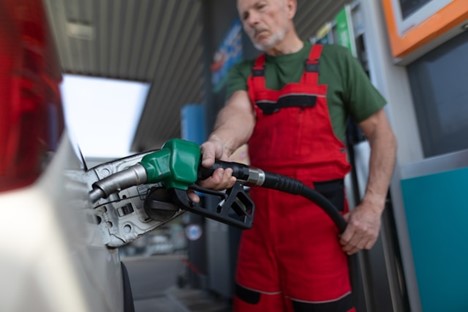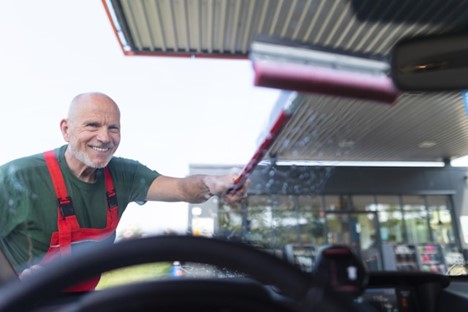Nick Kambitsis Raceway Petroleum

Nick Kambitsis – Background
Nicholas Kambitsis is the Owner and President of Raceway Petroleum, Inc., and serves as Owner and Managing Member of NDK Realty, LLC, Raceway Realty, LLC, and Raceway Properties, LLC. His expertise spans various sectors, including gasoline stations, convenience stores, and real estate, where his multi-tasking ability and innovative approach to problem-solving have proven successful. His meticulous attention to detail and people-centric approach set him apart as a true leader in the industry.
Raceway Petroleum
As the Chief Operating Officer of Raceway Petroleum, Inc., Nick Kambitsis oversees a large workforce and manages the complex operations of gasoline stations and convenience stores that serve thousands of customers daily. His experience in corporate team management allows him to address the needs of his employees while ensuring top-notch customer service.
Beyond his business acumen, Nicholas Kambitsis is a committed community leader, dedicated to supporting his family, church, and various local charities. He is also actively involved in the Pediatric Program Committee of the Board of Directors at The Bristol Myers Squibb Children’s Hospital at Robert Wood Johnson University Hospital, exemplifying his passion for giving back and making a positive impact on the community.
Building Customer Loyalty in the Service Industry
The service industry, particularly in gas stations and convenience stores, thrives on customer loyalty. Repeat business is crucial to the success and longevity of these establishments. Building customer loyalty is more than just providing a product or service, though; it’s about creating an experience that makes customers want to return. Below, Nick Kambitsis of Raceway Petroleum explains key strategies for building customer loyalty in gas stations and convenience stores, focusing on personalized service and reward programs.
The Importance of Customer Loyalty
Customer loyalty is the backbone of the service industry. A loyal customer base ensures steady revenue, positive word-of-mouth marketing, and a strong brand reputation. Loyal customers are more likely to spend more and recommend your business to others, driving new business through referrals. They are also more forgiving when mistakes occur, allowing businesses to maintain a positive relationship even through challenges.
Personalized Service
Personalized service is a cornerstone of building customer loyalty. Every customer wants to feel valued and recognized when they visit a business. Nick Kambitsis of Raceway Petroleum provides a few ways for service industry professionals to personalize their offerings:
- Customer Greetings: Train employees to greet customers warmly as they enter the store. A simple “Hello” or “Good morning” goes a long way in making customers feel welcome.
- Remembering Regulars: Encourage staff to remember the names and preferences of regular customers. This personal touch can foster a sense of belonging and encourage repeat visits.
- Customized Recommendations: Offer personalized product recommendations based on customers’ past purchases or preferences. This approach demonstrates that you understand their needs and are willing to go the extra mile.
- Tailored Promotions: Send targeted promotions or discounts to regular customers based on their purchase history. This strategy can increase customer engagement and encourage them to return to your store.

Reward Programs
Reward programs are an effective way to build customer loyalty by incentivizing repeat business. Nick Kambitsis of Raceway Petroleum provides reward programs suggestions for gas stations and convenience stores:
- Points-Based Systems: Customers earn points for each purchase, which they can redeem for discounts, free items, or exclusive offers. This system encourages customers to return frequently and accumulate points over time.
- Loyalty Cards: Provide customers with a loyalty card that tracks their purchases. Be sure to offer rewards or discounts after a certain number of purchases, encouraging them to return to complete their card.
- Membership Programs: Create a membership program with exclusive benefits such as discounts, early access to promotions, or special events. This approach fosters a sense of community and exclusivity among loyal customers.
- Mobile Apps: Develop a mobile app that allows customers to track their rewards, receive notifications about promotions, and access special offers. Mobile apps can also provide valuable data for personalized marketing campaigns.
Exceptional Customer Service
Exceptional customer service is the foundation of building customer loyalty. Customers remember how they are treated, and positive experiences lead to repeat business and word of mouth referrals.
- Responsive Communication: Ensure that employees are attentive to customer needs and respond promptly to inquiries or issues. A quick response shows that you value their time and business.
- Problem Resolution: Train staff to handle customer complaints effectively and with empathy. A well-handled complaint can turn a dissatisfied customer into a loyal one.
- Consistency: Maintain consistent service quality across all locations and shifts. Consistency builds trust and reliability, encouraging customers to return.
- Clean and Safe Environment: Keep the store clean and well-maintained. A clean environment creates a positive impression and enhances the overall customer experience.
Nick Kambitsis of Raceway Petroleum emphasizes how building customer loyalty in the service industry requires a combination of personalized service, reward programs, and exceptional customer service. By implementing these strategies, businesses can create a loyal customer base that ensures steady revenue and promotes brand growth. Remember, customer loyalty is a long-term commitment that requires consistent effort and a customer-centric approach. With the right strategies in place, your business can build lasting relationships with customers and stand out in the competitive service industry.
Crisis Management Preparing for the Unexpected
Gas stations and convenience stores are critical components of the service industry, providing essential goods and services to millions of people on a daily basis. Given their importance, these businesses must be prepared to handle unexpected crises, from natural disasters to public health emergencies. Effective crisis management is crucial for minimizing disruption, ensuring safety, and maintaining business continuity.
The Importance of Crisis Management
Crises can occur at any time, often without warning. Nick Kambitsis of Raceway Petroleum explains that natural disasters like hurricanes, floods, earthquakes, or wildfires can devastate infrastructure and disrupt supply chains. Public health crises, such as the COVID-19 pandemic, can bring their own set of challenges, including health and safety risks, regulatory changes, and operational disruptions.
Effective crisis management allows businesses to respond quickly, minimize damage, and protect employees and customers. It also helps maintain trust and loyalty among customers, who rely on these businesses for essential goods and services.
Developing a Plan
A comprehensive crisis management plan is the foundation of any effective response strategy. This plan should address potential risks, outline roles and responsibilities, and establish protocols for communication and response. Nick Kambitsis of Raceway Petroleum discusses below the components to consider when developing a crisis management plan for gas stations and convenience stores:
Risk Assessment
Identify potential risks and hazards that could impact your business. Consider both internal and external factors, such as natural disasters, public health emergencies, power outages, cyberattacks, and supply chain disruptions. Nick Kambitsis of Raceway Petroleum explains that these risks are essential for developing a plan that addresses a wide range of scenarios.
Emergency Response Team
Establish a dedicated emergency response team responsible for coordinating crisis management efforts. This team should include key personnel from various departments, such as management, operations, safety, and communications. Clearly define roles and responsibilities to ensure a coordinated response during a crisis.
Communication Protocols
Effective communication is critical during a crisis. Develop protocols for internal communication among staff, as well as external communication with customers, suppliers, and emergency services. Establish clear guidelines for who communicates what, when, and to whom. Consider using several communication channels, such as phone, email, text, and social media.
Safety and Evacuation Procedures
Nick Kambitsis of Raceway Petroleum stresses the importance of ensuring employee and customer safety by developing safety and evacuation procedures. These procedures should include evacuation routes, assembly points, and emergency contact information. Train employees on these procedures and conduct regular drills to ensure everyone knows what to do in case of an emergency.
Business Continuity Plan
A business continuity plan outlines how to keep the business running during and after a crisis. This plan should include strategies for maintaining operations, managing inventory, securing backup power sources, and addressing supply chain disruptions. Identify key vendors and suppliers to ensure continuity of essential goods and services.
Responding to a Crisis
Once a crisis occurs, rapid and effective response is crucial. Here’s how Raceway Petroleum responds to unexpected challenges:

Prioritize Safety
Ensure the safety of employees and customers, and if necessary, evacuate the premises and provide medical assistance to those in need. Keep emergency exits clear and accessible while following safety protocols outlined in the crisis management plan.
Communicate Transparently
During a crisis, Nick Kambitsis of Raceway Petroleum understands that communicating transparently with employees, customers, and stakeholders is paramount. Keep them informed about the situation, safety measures, and any changes to business operations. Use multiple communication channels to ensure your message reaches as many people as possible.
Assess the Impact
Evaluate the impact of the crisis on your business. Assess damage to the premises, equipment, and inventory. Determine if there are any disruptions to supply chains or operational processes. This assessment will guide your next steps in the recovery process.
Implement Business Continuity Measures
Follow the business continuity plan to maintain operations as smoothly as possible. This may involve relocating to a temporary site, adjusting business hours, or focusing on core services. Work with key suppliers to ensure a steady flow of essential goods and resources.
Review and Improve
After the crisis has been managed, conduct a thorough review of your response. Identify areas where the plan worked well and areas for improvement. Use this feedback to update your crisis management plan and strengthen your business’s resilience for future challenges.
Conclusion
In the competitive landscape of the service industry, the guidance and expertise of leaders like Nick Kambitsis at Raceway Petroleum are invaluable. From building customer loyalty through personalized service and innovative reward programs to navigating unexpected crises with robust crisis management plans, these insights reflect a comprehensive approach to running successful gas stations and convenience stores.
The emphasis on personalized customer service underscores the significance of creating meaningful connections with customers. Whether it’s remembering a regular’s favorite coffee or offering tailored promotions, these small gestures contribute to long-term loyalty and repeat business.
Incorporating effective reward programs further strengthens this bond, giving customers tangible reasons to return. By implementing points-based systems, loyalty cards, and mobile apps, businesses can effectively foster a stronger sense of community and exclusivity that sets them apart from competitors.
Crisis management, while often overlooked until a crisis actually strikes, is equally crucial. Raceway Petroleum’s thorough approach to emergency preparedness demonstrates that having a well-defined plan is essential to ensuring safety, maintaining business continuity, and minimizing the potential impact of unexpected events. From establishing clear communication protocols to prioritizing safety and assessing the impact, each step is designed to guide businesses through turbulent times with confidence and clarity.
Together, these strategies provide a blueprint for success in the service industry. By combining personalized customer service, innovative reward programs, and robust crisis management, businesses like Raceway Petroleum become capable of not only weathering the storms, but also thriving by turning challenges into opportunities for growth and connection.
Ultimately, businesses that focus on people—whether they are employees, customers, or the wider community—are the ones that stand the test of time. With leaders like Nick Kambitsis, it’s clear that success in the service industry is about much more than just selling products; it’s about building relationships, fostering trust, and creating lasting value.
To learn more about Nicholas Kambitsis, Raceway Petroleum, and to find articles related to the service industry, business, and real estate, follow along at his blog.